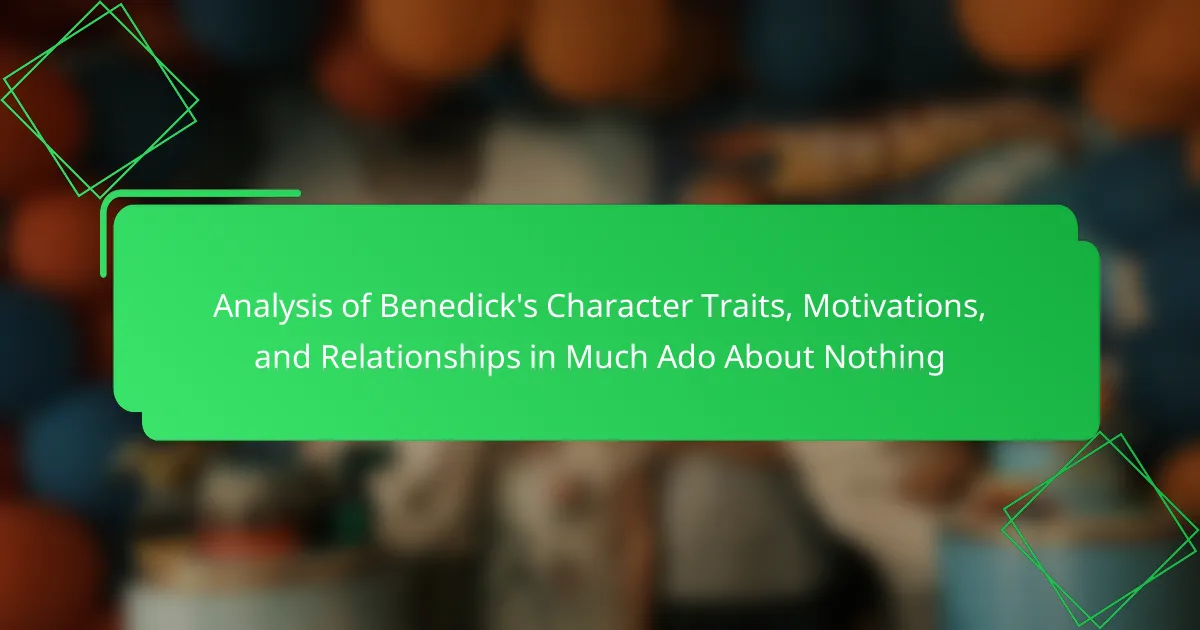
What are the key character traits of Benedick in Much Ado About Nothing?
Benedick in Much Ado About Nothing exhibits several key character traits. He is witty, showcasing a sharp sense of humor throughout the play. Benedick is also proud, often boasting about his independence and disdain for love. His loyalty to his friend Claudio is evident, as he supports him against perceived wrongs. Additionally, Benedick demonstrates a capacity for growth; he evolves from a skeptic of love to someone who embraces it. His intelligence is highlighted in his clever banter and quick thinking. Finally, Benedick’s vulnerability is revealed when he admits his feelings for Beatrice, showcasing a more sensitive side. These traits collectively define Benedick’s complex character in the narrative.
How do Benedick’s traits influence his relationships with other characters?
Benedick’s traits significantly influence his relationships with other characters in “Much Ado About Nothing.” His wit and intelligence create a bond with characters like Beatrice, as they engage in playful banter. This banter reveals their mutual attraction and deep understanding of each other. Benedick’s initial reluctance to commit to love distances him from characters who value romance, such as Claudio. His loyalty to friends like Pedro showcases his honorable nature, further strengthening those relationships. However, his skepticism about love initially isolates him from romantic connections. Ultimately, Benedick’s growth throughout the play, as he embraces love, alters his dynamics with Beatrice and the group, leading to a more profound connection.
What specific traits make Benedick a unique character in the play?
Benedick is a unique character in “Much Ado About Nothing” due to his wit, skepticism about love, and character development. His sharp humor sets him apart from other characters. Benedick often engages in clever banter, showcasing his intelligence. He initially expresses disdain for romantic relationships, claiming he prefers freedom. This skepticism is evident in his conversations with friends, where he mocks the idea of love. However, his character evolves throughout the play. Benedick’s transformation occurs when he falls in love with Beatrice. This shift highlights his capacity for change. Ultimately, Benedick’s unique blend of humor, skepticism, and growth makes him a compelling figure in the play.
How does Benedick’s wit shape his interactions with Beatrice?
Benedick’s wit significantly shapes his interactions with Beatrice by creating a dynamic of playful banter. His sharp humor often leads to verbal sparring, which establishes a unique connection between them. This wit allows Benedick to challenge Beatrice, making their exchanges lively and engaging. Their interactions are marked by mutual teasing, reflecting their intellectual compatibility. Benedick’s clever remarks often reveal deeper feelings, as he masks vulnerability with humor. This approach keeps their relationship both playful and complex. Ultimately, his wit serves as a bridge that fosters intimacy while allowing for conflict. Their repartee highlights the tension between love and pride in their relationship.
What motivations drive Benedick’s actions throughout the play?
Benedick’s actions throughout “Much Ado About Nothing” are primarily driven by his desire for independence and his evolving feelings for Beatrice. Initially, Benedick values his bachelorhood and mocks love, showcasing a commitment to freedom. As the play progresses, his motivations shift as he becomes increasingly attracted to Beatrice. This attraction leads him to reconsider his views on love and relationships. Benedick’s decision to challenge Claudio reflects his loyalty to his friends and his growing sense of honor. His motivations illustrate a journey from cynicism to a more nuanced understanding of love and commitment.
Why does Benedick initially resist love and commitment?
Benedick initially resists love and commitment due to his skepticism about romantic relationships. He expresses a belief that love leads to vulnerability and foolishness. Benedick often mocks the idea of marriage and claims it brings loss of freedom. His experiences with love have made him wary. He values his independence and is reluctant to change his lifestyle. Benedick’s resistance also stems from societal expectations and peer influence. His friends, particularly Claudio, reinforce his views on love. This creates a conflict between his feelings for Beatrice and his self-imposed barriers.
How do Benedick’s motivations evolve by the end of the play?
Benedick’s motivations evolve from skepticism about love to a genuine desire for connection by the end of the play. Initially, Benedick expresses a disdain for romantic relationships, prioritizing his independence. He mocks others’ romantic entanglements, particularly Claudio and Hero’s relationship. However, upon hearing of Beatrice’s feelings for him, his perspective begins to shift. Benedick starts to reconsider his stance on love, driven by his affection for Beatrice. By the conclusion, he fully embraces love, proposing to Beatrice. This transformation highlights his growth from cynicism to a commitment to emotional intimacy.

How does Benedick’s relationship with Beatrice develop?
Benedick’s relationship with Beatrice evolves from mutual disdain to deep affection. Initially, they engage in witty banter and insults, showcasing their sharp intellects. This antagonism masks a deeper attraction that both characters are reluctant to acknowledge. As the play progresses, external influences, such as their friends’ schemes, lead Benedick to reconsider his feelings. He overhears a conversation revealing Beatrice’s love for him, prompting a transformation in his attitude. Benedick’s willingness to challenge his previous beliefs signifies his growth. By the end, they confess their love, culminating in a union that highlights their compatibility. This development underscores themes of love, identity, and the complexity of relationships in the play.
What are the key moments that define Benedick and Beatrice’s relationship?
Benedick and Beatrice’s relationship is defined by several key moments. Their initial banter showcases their mutual disdain and sharp wit. This playful conflict sets the stage for their dynamic. The pivotal moment occurs when they overhear others discussing their feelings for each other. This revelation shifts their relationship from antagonism to affection. Benedick’s decision to challenge Claudio for Beatrice further solidifies his commitment. Their eventual confession of love marks the culmination of their journey. These moments illustrate the evolution of their relationship from rivalry to romance. Each key moment highlights their unique bond and individual growth.
How does their banter reflect their true feelings for each other?
Benedick and Beatrice’s banter reveals their true feelings through playful insults and witty exchanges. Their constant teasing demonstrates a deep familiarity and affection for one another. This dynamic showcases their mutual respect and intellectual compatibility. They often use sarcasm, which masks their vulnerability. For instance, Benedick’s remarks about Beatrice’s sharp tongue indicate admiration hidden beneath mockery. Similarly, Beatrice’s jabs at Benedick’s masculinity reflect her awareness of his strengths and weaknesses. Their banter acts as a defense mechanism against genuine emotional expression. Ultimately, their interactions suggest that their love is rooted in a complex blend of rivalry and attraction.
What role does external influence play in their relationship dynamics?
External influence significantly shapes the relationship dynamics between Benedick and Beatrice in Much Ado About Nothing. Their interactions are heavily impacted by societal expectations and the opinions of their friends. The meddling of characters like Claudio and Don Pedro propels Benedick to reconsider his feelings for Beatrice. These external pressures create a context where their witty banter evolves into genuine affection. Additionally, the influence of their peers leads to misunderstandings that challenge their relationship. The external environment fosters both conflict and resolution, ultimately guiding their journey toward love. This dynamic illustrates how relationships can be molded by outside forces, underscoring the complexity of human connections in the play.
How do Benedick’s friendships influence his character development?
Benedick’s friendships significantly influence his character development by shaping his views on love and loyalty. His bond with Claudio exposes him to romantic ideals. This friendship initially leads Benedick to adopt a cynical stance on love. However, as Claudio falls in love, Benedick begins to reconsider his own feelings. His interactions with friends like Beatrice challenge his beliefs. Their witty banter reveals Benedick’s vulnerability and desire for connection. Ultimately, Benedick’s friendships encourage personal growth. They help him transition from a self-proclaimed bachelor to someone willing to embrace love. This evolution highlights the impact of social relationships on his character arc.
What impact do his friendships with Claudio and Pedro have on his views about love?
Benedick’s friendships with Claudio and Pedro significantly influence his views about love. Initially, Benedick expresses skepticism towards romantic relationships. His banter with Claudio reflects this dismissive attitude. However, as Claudio becomes enamored with Hero, Benedick witnesses the transformative power of love. This experience challenges his previous notions. Pedro’s encouragement further shapes Benedick’s perspective. He begins to appreciate love’s potential for joy and fulfillment. Ultimately, these friendships lead Benedick to embrace love, culminating in his own romantic pursuit of Beatrice.
How does Benedick’s loyalty affect his decisions throughout the play?
Benedick’s loyalty significantly influences his decisions in “Much Ado About Nothing.” His loyalty to friends like Claudio and Beatrice guides his actions. When Claudio is wronged, Benedick defends him, showcasing his commitment to friendship. Benedick’s loyalty to Beatrice also affects his choices. He ultimately chooses to challenge Claudio for her sake. This act reveals the depth of his loyalty and love. Benedick’s decisions reflect his values, prioritizing friendship and love over societal expectations. His loyalty shapes his character arc, moving from a self-serving bachelor to a devoted partner.

What are the broader themes reflected in Benedick’s character?
Benedick’s character reflects themes of love, honor, and transformation. His initial disdain for love showcases a theme of skepticism towards romantic relationships. As the play progresses, Benedick’s evolution into a loving partner highlights the theme of personal growth. His witty banter emphasizes the theme of intelligence and the importance of communication in relationships. Additionally, Benedick’s loyalty to friends underscores the theme of friendship and honor. His willingness to challenge societal expectations showcases the theme of individuality. Overall, Benedick embodies the complexities of human emotions and relationships throughout “Much Ado About Nothing.”
How does Benedick embody the theme of transformation in the play?
Benedick embodies the theme of transformation through his evolving perceptions of love and relationships. Initially, Benedick is portrayed as a witty and cynical bachelor. He openly mocks the idea of love and commitment, stating that he will never marry. However, his character undergoes significant change after his interactions with Beatrice. Benedick’s transformation begins when he overhears a conversation where friends convince him that Beatrice loves him. This revelation challenges his previous beliefs about love. As he contemplates the possibility of a relationship, Benedick becomes more introspective and vulnerable. His willingness to change is further demonstrated when he ultimately declares his love for Beatrice and agrees to marry her. This shift from skepticism to acceptance highlights Benedick’s personal growth. His transformation reflects the play’s broader themes of love and the potential for change within individuals.
What lessons can be learned from Benedick’s journey regarding love and friendship?
Benedick’s journey teaches the importance of vulnerability in love and the value of genuine friendship. Initially, Benedick is cynical about love and avoids emotional connections. His transformation begins when he falls for Beatrice, challenging his previous beliefs. This shift illustrates that love requires openness and the willingness to embrace one’s feelings. Additionally, Benedick’s loyalty to his friends, especially Claudio, highlights the significance of supporting loved ones. His journey emphasizes that true friendship involves honesty and standing by friends during difficult times. Ultimately, Benedick’s experiences reveal that love and friendship thrive on trust and emotional honesty.
What practical insights can be drawn from Benedick’s character for modern audiences?
Benedick’s character offers practical insights into the complexities of love and personal growth. He begins as a cynical bachelor, resistant to commitment. His transformation highlights the importance of vulnerability in relationships. Modern audiences can learn that embracing change can lead to deeper connections. Benedick’s witty banter illustrates the value of humor in navigating romance. He also shows that true love can challenge preconceived notions. His journey emphasizes the significance of communication and honesty in partnerships. Ultimately, Benedick’s evolution encourages individuals to be open to love and self-discovery.
The main entity of this article is Benedick, a character from Shakespeare’s “Much Ado About Nothing.” The article provides an analysis of Benedick’s key character traits, including his wit, pride, loyalty, and capacity for growth, as well as how these traits influence his relationships with other characters, particularly Beatrice. It explores Benedick’s motivations, his initial resistance to love, and the evolution of his views throughout the play. Additionally, the article examines the impact of his friendships on his character development and the broader themes reflected in his journey, offering practical insights relevant to modern audiences.


